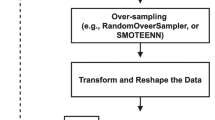Abstract
The purpose of this paper is to create a smart and effective tool for evaluating students in classroom objectively by overcoming human subjectivity resulting from lack of experience of instructors, and students’ over-trust in themselves. We had provided instructors in Sur university with the “Program for Student Assessment (PISA)” tool to assess it’s positive impact on academic performance, self-regulation, and improvement on their final exam scores. The study sample included in this study was the students enrolled at Sur University College at the time of data collection in the 2018/2019 semester. In the purpose of testing the efficiency of four models in predicting students’ final scores based on their mark in the first exam. The four tested algorithms were: Multiple Linear Regressions (MLP), K-mean cluster, Modular feed for-ward neural network and Radial Basis Function (RBF) (De Marchi and Wendland, Appl Math Lett 99:105996, 2020 [3], Niu et al, Water 11(1):88, 2019 12]). After comparing the four models’ effectiveness in predicting the final score, results show that RBF has the highest average classification rate, followed by neural network and K-mean cluster, while Multiple Linear Regressions was the worst at performance. RBF has been used to create the Instructor Program for Student Assessment (PISA).predicting student performance early will help students to improve their performance and help instructors modify their teaching style to fit their student’s needs.
Access this chapter
Tax calculation will be finalised at checkout
Purchases are for personal use only
Similar content being viewed by others
References
E. Akgün, M. Demir, Modeling course achievements of elementary education teacher candidates with artificial neural networks. Int. J. Assess. Tools Educ. 5(3), 491–509 (2018)
A.A. Darrow, C.M. Johnson, A.M. Miller, P. Williamson, Can students accurately assess themselves? Predictive validity of student self-reports. Update Appl. Res. Music Educ. 20(2), 8–11 (2002).
S. De Marchi, H. Wendland, On the convergence of the rescaled localized radial basis function method. Appl. Math. Lett. 99, 105996 (2020)
M. Gerasimovic, L. Stanojevic, U. Bugaric, Z. Miljkovic, A. Veljovic, Using artificial neural networks for predictive modeling of graduates’ professional choice. New Educ. Rev. 23(1), 175–189 (2011)
Z. Ibrahim, D. Ibrahim, Predicting students’ academic performance: comparing artificial neural network, decision tree and linear regression, in 21st Annual SAS Malaysia Forum, 5th September (2007)
B.A. Kalejaye, O. Folorunso, O.L. Usman, Predicting students’ grade scores using training functions of artificial neural network. Science 14(1) (2015)
K. Kongsakun, C.C. Fung, Neural network modeling for an intelligent recommendation system supporting SRM for Universities in Thailand. WSEAS Trans. Comput. 11(2), 34–44 (2012)
K. Leithwood, S. Patten, D. Jantzi, Testing a conception of how school leadership influences student learning. Educ. Admin. Quart. 46(5), 671–706 (2010)
I. Lykourentzou, I. Giannoukos, G. Mpardis, V. Nikolopoulos, V. Loumos, Early and dynamic student achievement prediction in e-learning courses using neural networks. J. Am. Soc. Inform. Sci. Technol. 60(2), 372–380 (2009)
Z. Miljković, M. Gerasimović, L. Stanojević, U. Bugarić, Using artificial neural networks to predict professional movements of graduates. Croatian J. Educ. 13, 117–141 (2011)
M.F. Musso, E. Kyndt, E.C. Cascallar, F. Dochy, Predicting general academic performance and identifying the differential contribution of participating variables using artificial neural networks. Frontline Learn. Res. 1(1), 42–71 (2013)
W.J. Niu, Z.K. Feng, B.F. Feng, Y.W. Min, C.T. Cheng, J.Z. Zhou, Comparison of multiple linear regression, artificial neural network, extreme learning machine, and support vector machine in deriving operation rule of hydropower reservoir. Water 11(1), 88 (2019)
M. Pavleković, M. Zekić-Sušac, I. Đurđević, A neural network model for predicting children’s mathematical gift. Croatian J. Educ. Hrvatski časopis za odgoj i obrazovanje 13(1), 10–41 (2011)
K. Struyven, F. Dochy, S. Janssens, Students’ perceptions about evaluation and assessment in higher education: a review. Assess. Eval. Higher Educ. 30(4), 325–341 (2005)
Acknowledgements
I would like to thank the management of Sur University College for the continued support and encouragement to conduct this research.
Author information
Authors and Affiliations
Corresponding author
Editor information
Editors and Affiliations
Rights and permissions
Copyright information
© 2021 Springer Nature Singapore Pte Ltd.
About this paper
Cite this paper
Alodat, M. (2021). Predicting Student Final Score Using Deep Learning. In: Bhatia, S.K., Tiwari, S., Ruidan, S., Trivedi, M.C., Mishra, K.K. (eds) Advances in Computer, Communication and Computational Sciences. Advances in Intelligent Systems and Computing, vol 1158. Springer, Singapore. https://doi.org/10.1007/978-981-15-4409-5_39
Download citation
DOI: https://doi.org/10.1007/978-981-15-4409-5_39
Published:
Publisher Name: Springer, Singapore
Print ISBN: 978-981-15-4408-8
Online ISBN: 978-981-15-4409-5
eBook Packages: Intelligent Technologies and RoboticsIntelligent Technologies and Robotics (R0)




